Premium Only Content
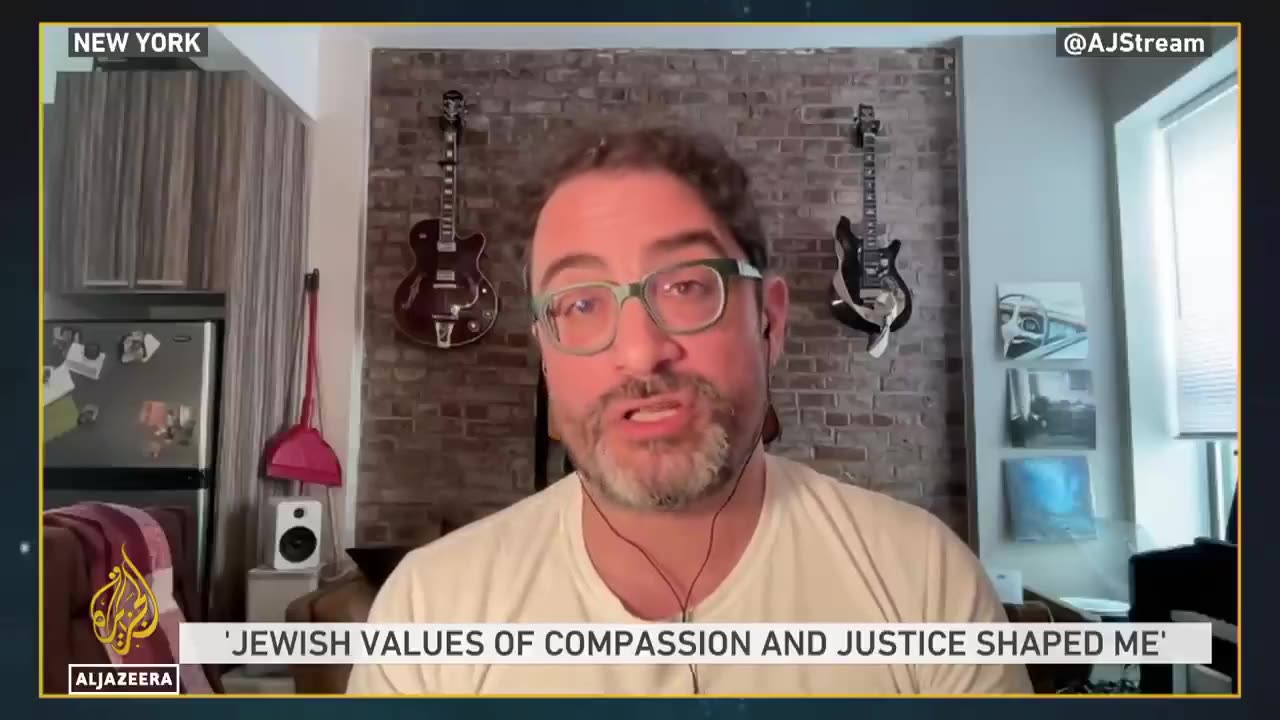
Gabor Maté and Son Discuss Gaza Genocide
Gabor Maté and Son Discuss Gaza Genocide
Dr. Gabor Maté, a renowned trauma expert, and his son Daniel, a filmmaker and musician, engage in a deep conversation about the ongoing violence in Gaza, which they describe as a form of genocide. They explore the profound impact that witnessing this brutality has had on their personal lives, professional work, and relationships. Both emphasize the deep psychological and emotional toll that such conflicts inflict, not just on those directly involved, but also on global observers. They critically examine whether this devastating war might offer a pivotal moment to break the cycle of trauma and destruction that has plagued the region for decades. Their discussion reflects a blend of personal anguish and hope for transformative change, rooted in their belief in the power of collective healing and the potential for peace, even in the most dire circumstances.
Via: Al-Jazeera
Each one of us has roughly 86 billion brain cells capable of transmitting information in fractions of a millisecond. And yet, we're all struggling to comprehend the violence perpetrated non-stop and on live stream for the past 10 months. I'm Annelies Borges, and on this episode of the stream, we ask what it is that we feel in the face of such horror, and how to stand in solidarity in a world more divided than ever. And to help us answer those questions and more, we have two very special guests joining us today. Physician and Holocaust survivor, Dr. Gabor Mate, and musical theater composer, lyricist, and Dr. Gabor Mate's son, Daniel Mate. Thank you both so much for joining us here on the stream today. I would like to first ask you, you have been very vocal about your support for Palestine throughout the years. Why is it important to do that right now, despite the backlash from the Jewish community, especially, and obviously, in view of what's been happening in Gaza and in occupied territories? Gabor, can I get you to go first? It's important if you care about justice. It's important if you care about truth. It's important if you care about the emotional, spiritual, physical well-being of all people around the world, including the Jewish people. So it's not a question of taking sides, it's a question of being concerned with the fate of humanity. And Palestine right now is a focal point. It's a focus for all that is troubling and threatening humanity. So in supporting Palestinian rights, one is supporting human rights for everybody around the world. Daniel, what is your take? Why is it important for you to speak up? I'm not sure I can do better or even improve on my dad's answer there. I can speak for myself why it's important to speak up. It's a matter of my own sanity. The horrors that have been unfolding in Gaza, or I should say, sort of exploding in Gaza, since October 7th, and I say that because those horrors have existed there and have perpetrated there, primarily by Israel, for a long time. They've just accelerated and amplified exponentially in the last 10 months. I can't believe I'm using the number 10 to describe the number of months it's been going on. But to see them is to... Unless you're captured, I think, by an ideology that numbs you to the pain of the Palestinian people and that compels you to see only Jewish suffering and only a particular version of Jewish suffering, then to look what's happening in the face is to feel a deep revulsion, horror, perhaps anger, deep grief and sadness. But also, I think, in the face of the propaganda that has been unleashed by Israel and its enabler, the United States and Western media in general, there's a reaction that I've had and that many people I know have had, which is a kind of am I going crazy feeling. And in speaking out about it, in naming what we're seeing, I think we're keeping ourselves as well as we can. And I think that's important. I would like to ask Gabor about Jewish suffering. I mean, you are a Holocaust survivor. You went through that horrific chapter in our history. You lost loved ones, and yet you don't use it to justify what's currently happening, like many other people actually do. I would like to ask you why you think that is. Did you do a lot of work in terms of identifying that pain and trying to heal that trauma? As a physician and a healer, I work with trauma a lot. And many people, individually and collectively, have been traumatized in this world. But you don't use one trauma to justify another trauma. You don't use one trauma to make it OK that other people should be traumatized. So yes, as an infant, I almost lost my life during the Holocaust, and my grandparents died in Auschwitz. But that in no way justifies the death of a single Palestinian child in Gaza or anywhere else. So you simply do not use somebody's trauma to make it acceptable that somebody else should be hurt. And furthermore, the Jewish trauma that has occurred historically, and specifically during the Holocaust, is not answered, is not solved, is not salved, is not healed by traumatizing another people. In fact, it makes it worse. In fact, it makes it worse. Daniel, would you say you, I don't know, inherited some of that trauma? And would you say that, at least in part of your life, that shaped your views, shaped your opinions about the world? And how and when did that shift happen? How do you come to see things the way you see them now? Well, I inherited a lot. And I inherited a complicated cocktail, I would say, of perspectives. Some informed by trauma, some informed by deep moral principle and a very strong activist tradition in my family that we all take a lot of pride in, both my father and his brothers. And it's just an ethic in the Mate family that we're here to do our small, but to the maximum of our ability, our part to make the world less conducive to the sorts of horrors that nearly wiped out our bloodline and nearly resulted in me not existing. But in terms of how I see the situation, although I went to a Zionist summer camp as a kid, I also had an anti, I won't say anti-Zionist, but I will say anti-occupation, anti-oppression of the Palestinians' father to counterbalance that. So I never fully bought in to the narrative that the mainstream Jewish community was trying to sell to me, which was that the history of the Jewish people is one of suffering and anti-Semitism culminating in the redemption of the creation of the Zionist state of Israel. It never felt right to me. And so it didn't take too much. It took reading scholars like Noam Chomsky, brave Israeli journalists like Yaron Levy and Amir Haas, and of course, Palestinian voices like Rashid Khalidi and many, many others to show me that there's just a whole set of facts that if you grow up in the Zionist circles, you will not know them because you won't want to know them. But if you know them, you can't unknow them. And it changes everything. We have reached out to our community and asked if they wanted to ask you about the state of the world these days. And we received a bunch of questions for you guys. This is what Yipeng shared with us. Take a look. A question that I have for both Dr. Matei and Daniel is the conflation of anti-Zionism with anti-Semitism and the weaponization of anti-Semitism in the context of the ongoing genocide in Gaza. Would you be able to share your reflections on the realities of this weaponization of anti-Semitism, as well as the conflation of this feeling of quote-unquote unsafe with that of being uncomfortable confronting one's privilege of bearing witness to ongoing genocide and apartheid conditions in Palestine? Daniel, can I get you to share your thoughts on that? Yeah, certainly. Well, first of all, the conflation of anti-Zionism and anti-Semitism stems inexorably, in fact, ineluctably from the conflation of Zionism and Judaism. So if you believe, as Zionist propaganda would have it and tries to drill into the heads of young Jewish North Americans like I was, that to be Jewish is to be identified with this modern, highly militarized, nationalistic, and racist apartheid state, then of course any criticism of that state by the transitive principle will mean that you're attacking all Jews. But if you don't accept that frankly anti-Semitic premise because it supposes that Jews have no identity other than a national one and that the anti-Semites all throughout history were correct that we don't belong anywhere, that we should be segregated into ghettos and other contained spaces of just us, which is essentially what Israel is. It's a ghetto with nuclear weapons. Then if you don't accept that premise, then you're going to forcefully reject the notion that to criticize it is to malign the Jewish people. Israel doesn't speak for me. It doesn't act for me. And the notion that if someone objects to starving an entire population, murdering tens to hundreds of thousands of people, dispossessing close to a million people, and then reinforcing that and what can I say, reimposing that trauma every day of the last 75 years, if anyone objects to that, hates me, well that's actually an anti-Semitic principle and I reject it. Israel is a distortion at best of what Jewishness and Judaism are supposed to be. It's a complete misdirection and I see it as the number one threat to the safety and physical and mental and emotional and spiritual well-being of Jews everywhere. Gabor, you have a question now from Colby actually, take a look. I was hoping you could discuss and shed light onto the trauma that these infants in Gaza and these young children are going through and will have for the rest of their life and what can be done about it. It's going to be horrible. There were studies of Palestinian kids done over 20 years ago now that showed them amongst the most traumatized people in the world with mental health issues and behavior problems and physical problems and post-traumatic symptoms, a large percentage of them. What can we imagine is going to be the impact when so many of them are traumatized now, orphaned right now, physically hurt right now, emotionally devastated right now. The Palestinian healthcare system, which they're rightly very proud of, was struggling at the best of times to deal with the trauma to their children. Their future is almost unimaginable. They're struggling to deal with every single wound right now. Daniel, here's Katie with a very interesting question and it touches on some of the things that you've already mentioned, take a look. I'd really love for you both to speak to the ways that your Jewish values have actually allowed you to interrogate Zionism and unpack Zionism for yourselves. What wisdom have you taken from Judaism? What messages have you taken from Jewish culture that you think have benefited you and your capacity for social justice, capacity for unlearning propaganda and ability to interrogate the brutality and violence of the state of Israel? There's just a deep well of compassion that the Jewish tradition has. I believe the Hebrew word is rachamim. It's said over and over again in Hebrew liturgy, in Hebrew scripture and prayer. It relates very much to an Arabic word that is spoken all the time in Muslim prayers as well. There are other Jewish values that inform me in particular. One is, if I could say, it's the superpower of irony. What I mean by that is by being outsiders, by virtue of being outsiders throughout history, Jews have been able to look askance at prevailing wisdom and mainstream assumptions because we're looking at it slightly skewed, slightly from the outside. Of course, we've been at the receiving end of what power does to people and how it corrupts moral values. A wry sense of humor and ability to see through BS, I think, has served our people very well. I myself now am the co-host of a satirical podcast called Bad Hasbara, where all we do, me and another Jewish comedian, Matt Lieb, is every week the Israeli propaganda machine serves us up more and more Bad Hasbara, bad propaganda to killery and make fun of. I think that's an important skill, being able to see contradictions and hypocrisy and see where not just the emperor but the empire has no clothes. Lastly, just a sense of justice, righteousness, tzedek, a sense of being called to repair the world and bring it more into alignment with what it was created for. I'd like to invite you now to watch two recent news events related to Israel's war on Gaza and then get your reaction. First, here's Israel's Prime Minister, Netanyahu, speaking to the US Congress. America and Israel must stand together. Daniel, this was just a little fraction of what was speech punctuated by standing ovations. I'd like to know if you were watching and what were your thoughts when watching that speech? You know, I couldn't subject myself to the entire thing. I don't watch cringe television and the whole thing is so completely cringey. It looks like we're looking at a shot of the Washington Aquarium with all those trained clapping seals, clapping for that genocidal warmonger who has nothing but contempt for them and us here. What can I say? It's abominable that this person is welcomed into the highest halls of power and that he's subjected to that kind of fawning adulation. And I have to give my utmost respect to the one Democratic member of Congress who dared both show up and oppose, which is Rashida Tlaib, who held up a sign saying war criminal. That is the least he deserves in terms of rebuke and a cold, cold welcome. Now, Gabor, we have a short sequence of the mass displacement of Palestinians inside the Gaza Strip. Take a look. Here are families being told to evacuate hundreds. And you have been to Gaza and to the West Bank. You know these places. When you see scenes like this one, what goes through your mind? Well, on the pictorial level, it's impossible for me not to see this as reminiscent of so many other situations in history, including situations when Jews had to flee their places because of threat. But on the other hand, it's what's been going on for so long. So the transfer and the displacement of the indigenous population has been discussed as part of the Zionist project going back for well over 100 years. So in a sense, this is the culmination and the apotheosis, you might say, of the essence of the Zionist intent, which is to keep these places to these people, to make life impossible for them so that all the land could be available for Jewish occupation and settlement. So in that sense, it's just the most concrete and the most recent and the most brutal, but certainly not the first manifestations of the essence of Zionist ideology. And anybody who doesn't see that just hasn't studied history. Can I ask you briefly to describe what your trips to Gaza, to the West Bank, were like? I remember reading somewhere that you said you cried for days witnessing the level of violence, the level of suffering of the people. The first time I went to the West Bank in Gaza was during the first day of the fight when the situation was a lot better than it is right now. And even then, I cried every day for two weeks because I just couldn't believe that somehow I used to believe that this was justice, that this was history, that this was the salvation of the Jewish people. So you used to see the suffering imposed on the Palestinians. Most recently, I was back there two years ago in the West Bank. I was working with Palestinian women who had been tortured in Israeli jails and were suffering post-traumatic stress disorder. And again, it's almost difficult to put it into words. And all I can say to anybody is, if you don't know what's going on, if you want to know what's going on, visit, see for yourself. Of course, you can't visit Gaza right now, but anybody who goes to the West Bank listens to the Palestinians. I remember when I was in Gaza back in the 1990s and people were living on these cement hovels. And they said to me, just tell them, tell them what it's like for us. Tell them what happened to us. Tell our stories. And those stories still have not been told. And now we're seeing it played out every day on our screens. And people are still not listening. It's infuriating, to say the least. We are approaching the end of the show, but before we go, we have a few more questions from our community. Here's Nick from Let's Give a Damn. Take a look. We demand a free Palestine. I demand this every single day in a variety of ways. And I know you do too. But what does it mean for you, practically, as anti-Zionist Jews? What does it mean for Palestine to be free? Especially now that we know more clearly than ever that Israel does not want to live in peace with Palestinians and wants to remove them from their land and annihilate them if they don't leave. I know it's all theory at this point, but lots of theories have been shared. So in your opinion, what will it take, very practically, for Palestine to be free? Daniel, what is your take? What will it take for Palestine to be free? I try not to venture into having a political program or political platform because if I wanted that, I would go into politics and learn to lie about it for a living. I truly don't know what freedom will take. I know that certain things would have to end in order for that to be the case. What would replace them is an open question. I have my own vision of an egalitarian society from the river to the sea where Jews, at least those who can divest themselves and disabuse themselves of Zionist racist ideology, are free to live in peace and equality, one person, one vote, and equal rights for all with the Palestinians of that land. And of course, there would have to be a lot of truth and a lot of reconciliation, such as happened in South Africa and other places. But the occupation has to end. The siege has to end. Israel's apartheid mentality and infrastructure and policies is going to have to crumble. I shudder to think of what it's going to take. And I sometimes don't know what to hope for. Societies like Israel, who have gone completely mad, often take a catastrophic defeat on the order of a bloodbath in order to wake up and give up the ghost. I pray that that's not what it takes. And at the same time, the status quo can't continue. So if I think of, I think maybe the question, the way I would reframe the question is not exactly what framework do I see, but what would Palestine be free from? A free Palestine, it would be free from racism, be free from supremacy of anyone over anyone. And then what would it be free to do? It would be free to actually become a land that lives up to its reputation and its name and its tradition as a holy one and an embodiment of the best that humanity has to offer. And for that to happen, the apartheid regime of Israel has to be dismantled in some form or another and reconstitute itself as something closer to what humanity is actually capable of. Very well put. Gabor, here's one final question for you. Here's Gabriel. Take a listen. I know that healing is an individual thing, right? But healing is also a collective thing, something that happens collectively. How do we, after the war is over, hopefully sooner than later, meet the needs of the kids, the adults who have been suffering from this war? And how do we both meet individually and how do we heal as a society? You know, it's all matter of conditions and under the present conditions of the siege mentality inside Israel, where people see themselves as constantly under threat and they don't understand how their society is creating the threat to itself by how it treats the Palestinian population and the rest of the Middle East. Until we have conditions of peace, we can't even conceive of what healing might look like. But if people are no longer under threat and no longer perceive themselves under threat, and that means ending the occupation, ending the apartheid, ending the racism, ending the situation where Daniel and I could fly to Israel tomorrow and become citizens the day after whereas Palestinians were born there, can't even visit. Until we end that situation, we can't even talk about healing. If there was peace, if there was the sense of threat removed, then healing is possible both on the collective and on the individual level. Well, for that healing to even begin, peace needs to actually prevail. Thank you both so much, Gabor and Daniel, for being part of the stream today. And thank you all for watching. Don't forget to stay in touch with us online. You can send us your questions and suggestions with the hashtag or the handle AJStream and we'll look into them. Take care and I'll see you soon.
-
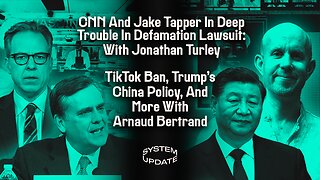 1:35:12
1:35:12
Glenn Greenwald
12 hours agoCNN And Jake Tapper In Deep Trouble In Defamation Lawsuit: With Jonathan Turley; TikTok Ban, Trump's China Policy, And More With Arnaud Bertrand | SYSTEM UPDATE SHOW #390
96.1K54 -
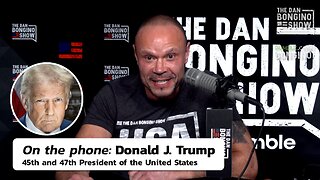 12:24
12:24
Dan Bongino Show Clips
12 hours agoPresident Trump Full Interview - 01/16/25
127K296 -
 1:27:39
1:27:39
Man in America
12 hours agoBig Pharma's Deadliest Lie is Being EXPOSED to the Masses w/ Jonathan Otto
63.4K22 -
 1:40:08
1:40:08
Precision Rifle Network
1 day agoS4E2 Guns & Grub - Training Vs. Competition
31.3K -
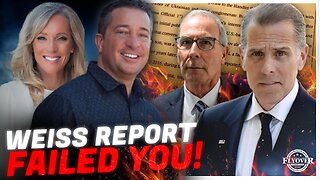 58:27
58:27
Flyover Conservatives
1 day agoGarrett Ziegler Breaks Down Special Councilor’s Report on Hunter Biden. Insights for Trump’s Top Picks. | FOC Show
58.9K3 -
 44:54
44:54
Steve-O's Wild Ride! Podcast
15 hours ago $10.28 earnedMark Wahlberg Threatened To Beat Up Jackass Cast Member - Wild Ride #251
109K11 -
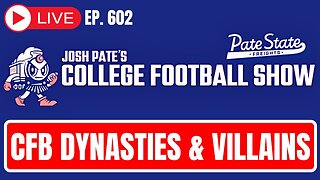 1:13:34
1:13:34
Josh Pate's College Football Show
9 hours ago $2.07 earnedCFB Dynasties & Villains | Marcus Freeman OR Ryan Day | 2025 Sleeper Teams | Cole Cubelic Joins
37.5K -
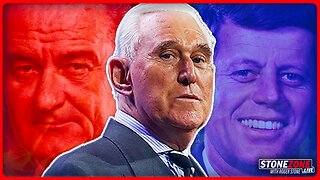 1:00:26
1:00:26
The StoneZONE with Roger Stone
8 hours agoSHOCKING NEW TAPE PROVES LBJ KILLED JFK! | The StoneZONE w/ Roger Stone
57.7K24 -
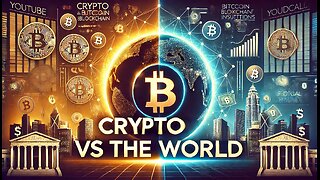 1:44:33
1:44:33
ObaTheGreat
10 hours agoCrypto vs The World w/ Oba The Great And YaBoySkey
42.2K4 -
 4:39:55
4:39:55
VOPUSARADIO
2 days agoPOLITI-SHOCK! "COUNTDOWN TO TRUMP" & THE GLOBALISTS BURNING IT ALL DOWN..LITERALLY!
17.4K1